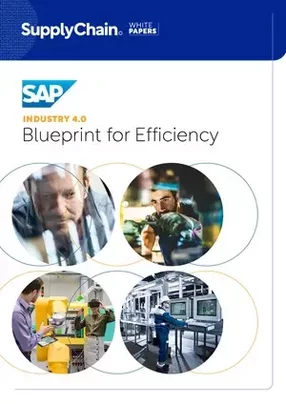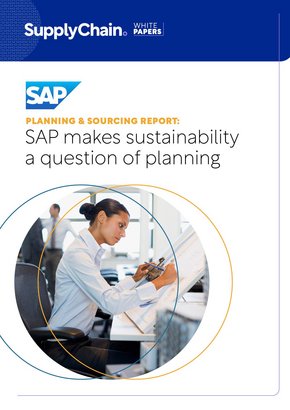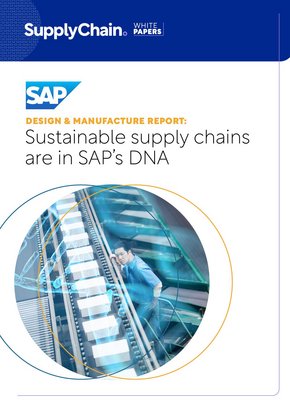In a period of unrivalled disruption, an organisation's supply chain has become either its strongest or weakest facet. Those businesses with agile and resilient supply chains have succeeded throughout the events of the past 18 months, while those that have been slow to adapt to digital transformation struggled and, in some cases, face falling further behind in the years to come.
It is uncertain what the future holds, but it is clear that transparency and resiliency will be key to navigating localised threats to productivity, such as the Suez Canal blockage, and the unforeseen global disasters highlighted by the unprecedented and pernicious impact of the COVID-19 pandemic. At the same time, enterprises are faced with increasing customer expectations in product cost, quality, excellence and experience.
Industry 4.0 offers a holistic approach to both these long-term and short-term obstacles to growth and productivity, says Dominik Metzger, Head of Product Management, Manufacturing and Industrial IOT at SAP, and the lead on SAP’s Industry 4.0 programme. “The main philosophy we at SAP follow with Industry 4.0 is to bring productivity increases into supply chains so that organisations of all sizes and industrial sectors are more resilient to disruptions.”
This process of connecting all core business operations revolves around the transformation of four often disparate but integral pillars across manufacturing, design operations, and employees: Intelligent Factories, Intelligent Products, Intelligent Assets and Empowered People.
“Often you find that too many companies focus on what happens within the four walls of a factory, but with our strategy for Industry 4.0, the real value creation goes far beyond that by connecting these four strategic pillars into end-to-end business processes,” Metzger says. “You can truly achieve a tremendous productivity increase if you connect your entire industrial processes - not only the factory - but where products are being engineered and designed, where recipes are formulated, materials are supplied to production, machines and assets are maintained and serviced, all the way through to the shop-floor, from end-to-end. Supply chains are constantly encountering disruption, and Industry 4.0 is all about equipping users at the right point in time with valuable insights to make the right decision and resolve such a disruption.”
Connecting business applications end to end through Industry 4.0 repositions businesses to be more resilient and increase productivity. But there are a multitude of other benefits, including increasing manufacturing quality and, as customers continue to raise the bar in terms of service expectations, significantly increase customer experience and satisfaction.
“Industry 4.0 can really be a differentiator to your customer service levels,” Metzger says. "An example that we find fascinating is allowing companies to move towards service offerings and away from classic product offerings. If you consider discrete manufacturers, rather than selling machines, automation equipment or other assets as their primary business model, Industry 4.0 allows them to offer output-based service models. In this way you guarantee the outcome of an industrial asset, and sell this as the primary service to your customers, rather than the physical asset itself. This allows businesses to diversify their product offering against international competition.”
SAP has been at the forefront of Industry 4.0 strategy since its inception more than a decade ago. As the global leader in enterprise business applications, SAP has guided many companies to successfully adopt Industry 4.0 and make it work for them.
“This is one of our biggest strengths,” says Metzger. “Our ability to deeply embed the wealth of machine, sensor and device data, in other words Industrial Internet of Things (IOT) data into business applications, from engineering to logistics and manufacturing to maintenance and service, thereby significantly improving end-to-end business processes.” SAP even offers a hyperscaler agnostic approach to leverage industrial IOT data. Cloud computing allows a tremendous scalability for Industry 4.0 strategies, while Edge computing ensures robustness of even the most mission critical manufacturing operations.
The second strength is SAP’s leadership on defining and developing initiatives for pan-industry adoption. The company is highly engaged in standardisation bodies and industry consortiums, and continues to drive the conversation forward.
“SAP was one of the founding members of consortias, such as the Platform Industrie 4.0 and the Open Industry 4.0 Alliance which are among the leading institutions driving standardisation and execution for Industry 4.0. The main obstacle for many customers has been TCO, the total cost of operations, the cost of ownership, and of manually integrating the worlds of hardware and software, IT and OT while making it scalable,” says Metzger. "I think this is where we have seen a huge leap forward in the past 10 years. That’s why standardising is key, and we are involved in this process at every level.”
The third strength of SAP is its unparalleled ecosystem of partners. Moving from ‘egosystems’ to ecosystems is the new normal in successfully bringing productivity increase with Industry 4.0 from concept to reality. SAP has partnerships with leaders, such as Microsoft for Cloud and Edge computing technologies as well as Siemens for Engineering and Design applications, to name a few. The strong partnerships expand into many other areas such as System Integrators and Machine and Equipment Makers.
The following series of white papers explores the four pillars of SAP’s Industry 4.0 strategy in depth. Discover expert insight into how to begin or supercharge your Intelligent Factory transformation journey, how to reduce downtime and overheads with Intelligent Assets, and realign your business to take advantage of the challenges and opportunities of today and tomorrow.
- CT47: The Multi-Purpose Mobile Computer for the Supply ChainTechnology
- The Art of Supply Chain Planning with Gartner, SAP, KinaxisSupply Chain Risk Management
- Why SAP Supply Chain Solutions Could Transform ManufacturingTechnology
- Why Ericsson Chose SAP to Enhance Supply Chain EfficienciesTechnology



